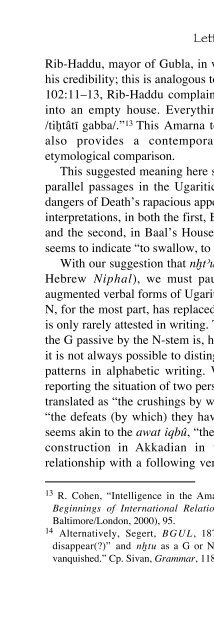A Primer on Ugaritic: Language, Culture, and Literature - enenuru
A Primer on Ugaritic: Language, Culture, and Literature - enenuru
A Primer on Ugaritic: Language, Culture, and Literature - enenuru
Create successful ePaper yourself
Turn your PDF publications into a flip-book with our unique Google optimized e-Paper software.
Letters 57<br />
Rib-Haddu, mayor of Gubla, in which he answers imputati<strong>on</strong>s <strong>on</strong><br />
his credibility; this is analogous to the situati<strong>on</strong> in our letter. in EA<br />
102:11–13, Rib-Haddu complains, “Now you are going to come<br />
into an empty house. Everything is g<strong>on</strong>e. Iamutterly ruined<br />
/tih˙ta®tˆä gabba/.” 13 This Amarna text not <strong>on</strong>ly fits the c<strong>on</strong>text but<br />
also provides a c<strong>on</strong>temporary <strong>and</strong> geographically close<br />
etymological comparis<strong>on</strong>.<br />
This suggested meaning here seems to fit the use of the term in<br />
parallel passages in the <strong>Ugaritic</strong> Baal Epic warning against the<br />
dangers of Death’s rapacious appetite. Despite a variety of possible<br />
interpretati<strong>on</strong>s, in both the first, Baal versus Mot (KTU 1.6:II, 23),<br />
<strong>and</strong> the sec<strong>on</strong>d, in Baal’s House (KTU 1.3:VIII, 20), the root h˙t}<br />
seems to indicate “to swallow, to crush.”<br />
With our suggesti<strong>on</strong> that nh˙t}u be interpreted as an N-stem (cp.<br />
Hebrew Niphal), we must pause to introduce another of the<br />
augmented verbal forms of <strong>Ugaritic</strong>. The reciprocal/passive pattern<br />
N, for the most part, has replaced the G passive in Hebrew, which<br />
is <strong>on</strong>ly rarely attested in writing. The process of the replacement of<br />
the G passive by the N-stem is, however, obscured by the fact that<br />
it is not always possible to distinguish between the Gp, Dp, <strong>and</strong> N<br />
patterns in alphabetic writing. We would suggest that this line<br />
reporting the situati<strong>on</strong> of two pers<strong>on</strong>s asking for help is awkwardly<br />
translated as “the crushings by which they have been crushed,” or<br />
“the defeats (by which) they have been defeated.” 14 This syntax<br />
seems akin to the awat iqbu®, “the word (which) he spoke,” kind of<br />
c<strong>on</strong>structi<strong>on</strong> in Akkadian in which a noun is in a bound<br />
relati<strong>on</strong>ship with a following verb marked by a subordinating, or<br />
13 R. Cohen, “Intelligence in the Amarna Letters,” Amarna Diplomacy. The<br />
Beginnings of Internati<strong>on</strong>al Relati<strong>on</strong>s (ed. R. Cohen <strong>and</strong> R. Westbrook;<br />
Baltimore/L<strong>on</strong>d<strong>on</strong>, 2000), 95.<br />
14 Alternatively, Segert, BGUL, 187, analyzes h˙t}i as an infinitive “to<br />
disappear(?)” <strong>and</strong> nh˙tu as a G or N impf 1cpl “to disappear(?)” or “to be<br />
vanquished.” Cp. Sivan, Grammar, 118, 131; Gord<strong>on</strong>, UT, 117.


